The radical left is growing across the United States. The movement spans class, race, gender, sexuality and generation, fueled by escalating discontent with the current economic situation.
Many look to Americans in their twenties and thirties to explain the growth in the movement. According to Max Strasser of the New Statesman, “There is a revival of left-wing intellectual thinking on a level unseen since the 1960’s. Young people are starting magazines and engaging in serious, substantial critique of the status quo.” He later continued, “At the moment there is intellectual ferment but only vague flickering of action.”
Yes, young intellectuals are graduating from college with huge amounts of debt, entering a labor market where 15.1% of people between the ages of sixteen and twenty-four are unemployed – more than twice the national unemployment rate. But to say that young intellectuals — and by that they mean “young people presently in or a product of academia” — are dominating the leftward shift and that the only actual organizing is “a flickering of action” is deeply misinformed. Emory student and past socialist organizer Nowmee points out, “This sentiment that leftist politics is tied to the academy is in itself elitist and erasing and mass movements that queer, undocumented, working class, people of color are building.”
The media have given young intellectuals a large chunk of the spotlight, particularly by depicting them as the face of the Occupy movement. However, like Nowmee said, grassroots leftist organizing is happening all over the U.S. right now, and the evidence is all over the media. Workers are calling for a raise in the minimum wage, fast food and Walmart workers are striking and demanding better working conditions, the immigrant justice movement is fighting for better workplace protections and other smaller leftist organizations are tackling the system in local efforts efforts that don’t ever even make it to the national stage.
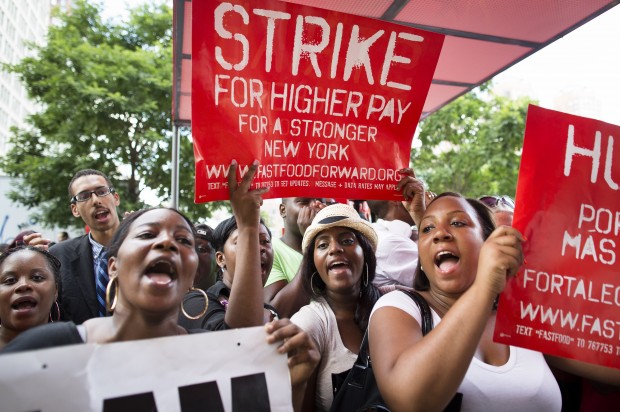
Via salon.com
Sarah Slichter is the Northeast US Coordinator for Young Democratic Socialists, which is the youth branch of Democratic Socialists of America, the largest socialist group in the U.S. She points to a divide that can help us understand why the movement is perceived as the work of a new generation:
“In the organization, there are a lot of people over sixty and under thirty. There is this lost generation in the middle. But what you can see is that the over sixty folks were radicalized by the anti-war movement, and the under thirty folks have grown up in neoliberal capitalism [which has tilted economic policy in favor of corporate interests]. That generation in the middle knew a softer kind of capitalism.”
These young people coming into the movement, which includes the explicitly and not explicitly socialist are not inventing the radical left – older organizers have been around for a long time – but as young people enter the movement, they bring a millennial spin to it. The movement is growing, as it always has.
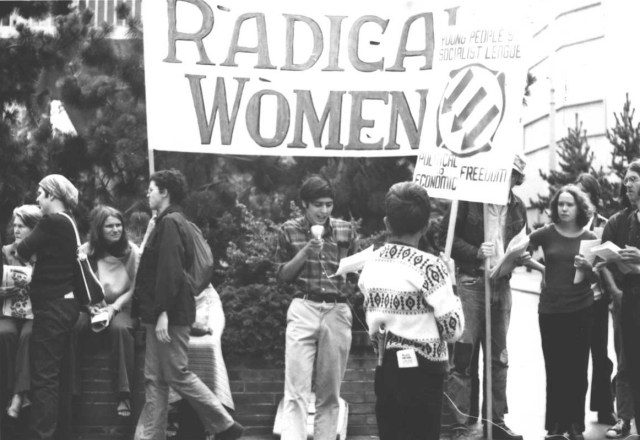
via Steve Ludwig
Anne Slater, National Organizer of Feminist Socialist group Radical Women, has been organizing since 1991. She reflected on how she’s seen a shift in the left:
“For a lot of time, many on the left argued that women and people of color weren’t real workers because they were working in the service industry, and people said that wasn’t a real industry. People said the only people you should orient the left towards were men in heavy industry. But now you have the Chicago teachers going on strike, the young people, the janitors, the immigrant workers who are organizing.”
The shift of the left away from their focus on heavy industry reflects the American economic shift, largely marked by Reagan’s economic policies. Peter Dreir breaks down Reagan’s legacy in the Nation:
“During his two terms in the White House (1981–89), Reagan presided over a widening gap between the rich and everyone else, declining wages and living standards for working families, an assault on labor unions as a vehicle to lift Americans into the middle class, a dramatic increase in poverty and homelessness, and the consolidation and deregulation of the financial industry…”
This widening gap has resulted in disproportionately dramatic increases in poverty and homelessness for women, people of color, and queer and trans* people. This is no accident. The deregulated economy capitalizes on points of difference to stratify groups and maintain an economic underclass. The queer community reflects this glaringly.
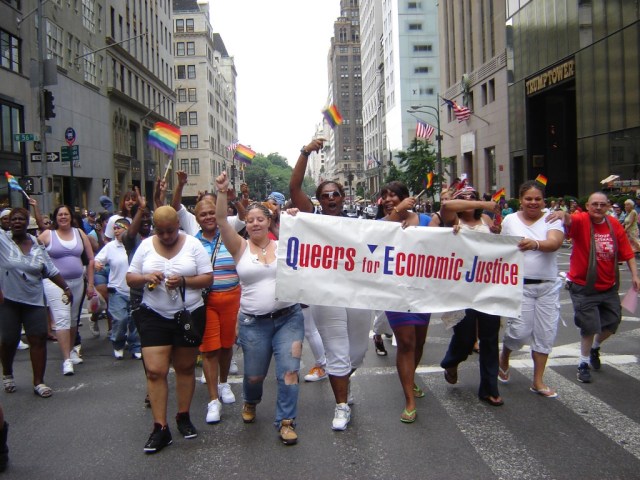
via q4ej.org
According to a Queers for Economic Justice report on LGBT Poverty and Hardship in a Time of Economic Crisis, queer people are more likely to be affected by poverty and homelessness, and within the queer population, poverty and homelessness are more severe for people of color, women and trans* people. A recent report by LGBT Map further illustrates the institutional and economic barriers for LGBTQ people of color from elementary school to retirement.
Because of these disparities, many organizations working against oppression center their work towards LGBT and racial justice around economic justice. Queers for Economic Justice, explains the demands of putting economic justice at the center of their work:
“It demands that we place the voices, histories, and experiences of those who experience poverty and struggle for basic survival at the center of decision–making. And it demands that we confront white supremacy and racism in every aspect of our work — ranging from how we frame and articulate issues to whose voices are centralized in strategic decision–making to who we depend on for our funding.”
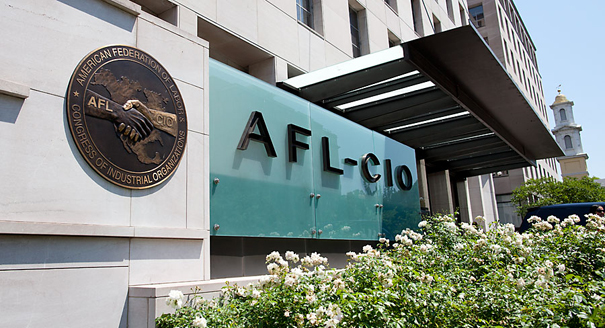
via politico.com
While grassroots groups organize, the American Federation of Labor and Congress of Industrial Organizations (AFL-CIO), one of the oldest and most institutionalized labor organizations in the U.S., has been one of the most consistently vocal mainstream advocates for LGBTQ workplace protections. The AFL-CIO recently amended its constitution to ban anti-trans* discrimination. It has also filed court briefs against DOMA, and advocated for the Employee Non-Discrimination Act.
Looking broadly at the American political situation in this moment, it can be hard to pick out how successful the lean Left actually is, because on the other end of the political spectrum, the Tea Party builds strength and economic policies continue to liberalize. Still, this November’s election cycle shows an increasing openness to progressive leftist candidates. Socialist candidate Kshama Sawant won a city council seat in Seattle, and even New York mayor-elect Bill DeBlasio once advocated democratic socialism, though whether or not he will truly work for workers rights and fair housing remains to be seen.
Not everyone in the new radical left agrees that the election of political candidates is a marker of success. While some fight for reform within the U.S. political system, others advocate much broader structural change. In any case, what is clear about the new left is that its diversity helps us understand the capitalist impact on queer and trans* people, people of color and women. From this vantage point, the left can envision what is necessary for a more socially and economically just world.
Maddie is a student activist, Women’s Studies Major and friend of the Geography department at Vassar College. She runs, reads, hikes and is known for photoshopping her friends’ faces onto weird images.


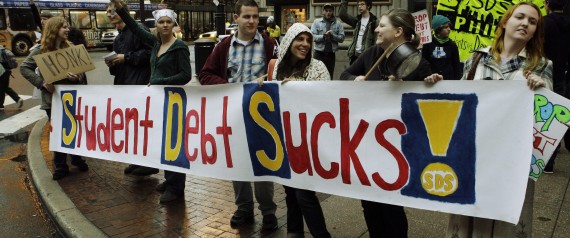
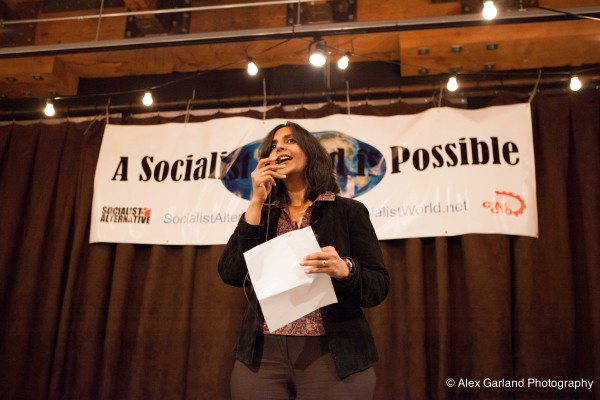

Yes! I’m sick of hearing about how self-interested and unmotivated my generation is. I think the only reason people don’t get involved on a political level is because they’re uninformed on how these issues affect them and how they can make shit happen. That’s definitely where I was at a year ago, but now I’m organizing nationally against invasive neoliberal free trade agreements like the Trans-Pacific Partnership. It’s slow, frustrating work, but it’s such a relief just to be doing SOMETHING about all the messed-up stuff that’s going on in the world.
Sorry for the rant, it’s just a relief to see something addressing this on my favorite website!
How am i not surprised by this!! I’m so happy to hear that the left is tired of all the inequality bullshit
This is great news! However, it’s worth pointing out that we should be careful when talking about ideology: not because it is a protest it is leftist. Not because they are protesting are they leftist.
Also, grassroots? Yes. Leftist? Perhaps. Radical? That could be stretching it a bit.
Disclaimer: I am definitely not as informed as I could be about this issue in the US, so this might not even apply to the conversation, but I just wanted to put that out there.
In any case, let the masses revolt!
BOOOM. Thank you for this article. I work as an organizer primarily on environmental issues, but of course these often intersect with social justice issues, and I’ve done a good amount around education funding too.
Props to this comment about this movement not really being “radical”
Working as an organizer, people in positions of power call me a “radical” to discredit our efforts and silence us. Is it radical to expect our democracy to function the way it’s supposed to, and to be questioning how backwards things have become because of corporate control of democratic institutions?
I don’t think fighting for all people to be treated equally like our constitution says we should is a radical notion at all. I don’t think expecting corporations to treat their workers fairly is radical either. That’s just what the powers that be want people to think.
Yeah, what you said!
This is a really good point! It’s super important to be thinking about how the “people in power” distort what the movement looks to accomplish. I do think it’s worth noting that these ideas we’re fighting for in the movement, while perhaps not radical, do require radical shifts in the world we currently live in.
good.
YES! hearing that Kshama Sawant won brightened my day so much yesterday. if i end up in seattle after graduation i want to see how if there’s any way i can get involved with her office
I think people have always been more leftist, especially as economic conditions worsen and shit gets worst. The elected “progressives” we have aren’t progressive enough, and if “radical” voices are what pushing conversation in the right directions, then I hope those radical voices get louder.
Yeah, depicting “young intellectuals” as the force behind Occupy was pretty questionable. I used to wonder if the people doing that had ever been to an Occupy camp. Mine had traditional-age college students, yes, but also a lot of homeless kids (many of them queer), homeless adults, disabled veterans, disillusioned health care workers, blue-collar folks who had been laid off, labor activists, immigrants, etc. Our founder was a working-class queer woman in her early 30s who was working two jobs while going to community college.
i harbor serious occupy press conspiracy theories… i’d only read about it in the news and seen pictures of new york, and horror stories about oakland. so then i went down to occupy oakland to see for myself, and it was basically a socialist utopia and hella diverse — white college students were definitely not the majority. i’ve never seen anything like it. and i never saw that story in the news.
I will never stop being delighted by the sight of QEJ getting time/space on my favorite website! <3
I’m so so happy Kshama Sawant won! so many of us in seattle support her and the call for a $15 an hour minimum wage, and rent control. She has been supportive and vocal about like all the issues, was side by side with us through occupy and the fast food strikes and she marched with us as an ally at seattle’s first ever trans* pride this summer.
This is such a huge win for social justice in seattle :)
This was a suuuuper great article. I think it’s time for the left to swing left again. I saw a great thing on Maddow (yeah I know) that detailed how both the Democratic and Republican parties have been solidly moving towards the right for decades. I hope that trend ends soon.
If democrats were as liberal as I wanted them to be, we’d have a single payer system instead of the ACA right now and a whole lot less bullshit.
Yeah mainstream politics have been moving to the right but damn I really hope a re-emergence of the left is occurring. I’m part of a socialist organisation in Australia which has been rapidly growing over the past few years.
Also the stats of LGBTQIA+ people being disproportionality affected is reflected in our organisation in that wow there are a lot of queer people who see the bullshit because they are affected, question it & choose to organise and act. LGBTQIA+ folks apparently make up 20% of the organisation I’m a part of across the country & on my campus club, we’re 100% queer.
(Australians who are interested in socialist politics should check out Marxism 2014 or read Revolution is for us: The Left and Gay liberation in Australia by Liz Ross)
Is there anyone in Columbus, Ohio who wants to start a queer democratic socialist group with me and my boif? Because I’m PRETTY sure we’re not the only two people in the midwest who have these things in common, but sometimes it sure seems like it.